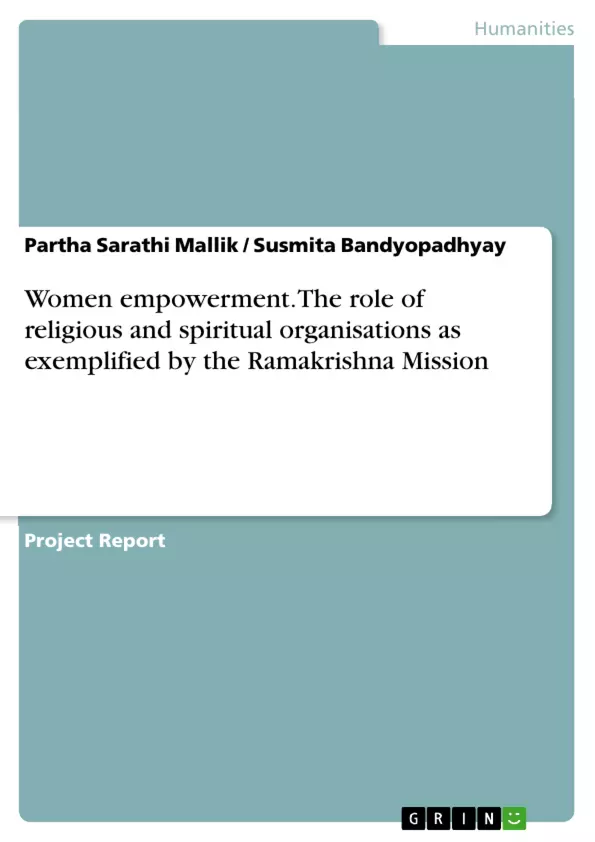The Ramakrishna Mission is a Hindu religious and spiritual organisation which forms the core of a worldwide spiritual movement known as the Ramakrishna Movement or the Vedanta Movement. As this mission bases its work on the Vedic principle of Karma Yoga, along with spiritual teaching, the organisation focuses on the socio-educational activities.
In this book a vivid presentation is made regarding the Educational and philanthropic activities done by this mission for the spread of qualitative education, skill development, medical facilities, vocational training among girls.
In the beginning the status of women and mission for women empowerment in global and Indian scenario is presented. Afterwards, the socio-cultural perception of Indian society towards women during the ancient, medieval and post-independence period and the individual and organisational initiatives, taken to ameliorate those conditions, are presented. In the following, the perception and contribution of three master minds, Ramakrishna Paramahamsa, Sarada Devi and Vivekananda towards women empowerment are presented. Finally, the author shows the detailed works done by Ramakrishna mission in different places of West Bengal, India in order to provide quality education, medical facilities, and skill development in general and girls in particular.
Women empowerment is a global mission due to its very spirit of inclusive development irrespective of caste, sex, colour, ethnicity or other facets of disadvantages but in the country like India the unequal treatment of women, differentiation of role, responsibility and status between male and women has a long rooted socio-cultural perspective. As result women are perceived as culturally devalued group. Although constitutional, legislative and policy measures are taken by the government of India for safeguard and upliftment of women, but the present data regarding differential developmental indictors like literacy, health, income, socio-political participation show that the development has not happened up to mark or at per the other gender.
Inhaltsverzeichnis (Table of Contents)
- Chapter-I
- Gender equality and Women Empowerment: International and Indian Scenario
- Chapter-II
- Historical perceptive of Status of Women in India
- Women in Pre-Independence Era
- Women in Post- Independence Era
- Chapter-III
- Sri RamakrishnaParamahansa : The Source of Inspiration
- Sri Sarada Devi: The Role Model of a Complete Woman
- Swami Vivekananda: The Great Visionary
- Chapter-IV
- Endeavours of Ramakrishna Mission sphere of education & philanthropic activities
- Endeavour in sphere of Health and Socio-Cultural Activities
Zielsetzung und Themenschwerpunkte (Objectives and Key Themes)
This book examines the significant role played by religious and spiritual organizations in women's empowerment, specifically focusing on the Ramakrishna Mission. The study delves into the historical context of women's status in India, exploring the socio-cultural perceptions that have shaped their position in society. Through the lens of the Ramakrishna Movement, the book analyzes the contributions of key figures like Sri RamakrishnaParamahansa, Sri Sarada Devi, and Swami Vivekananda in promoting women's empowerment. The book also highlights the practical work undertaken by the Ramakrishna Mission in areas such as education, healthcare, and skill development, showcasing its impactful interventions in empowering women.
- Women's Empowerment in India: Historical, Social, and Cultural Perspectives
- The Role of Religious and Spiritual Organizations in Promoting Women's Rights and Opportunities
- The Impact of the Ramakrishna Mission on Women's Education, Healthcare, and Socio-Economic Development
- The Influence of Key Leaders (Sri RamakrishnaParamahansa, Sri Sarada Devi, and Swami Vivekananda) on the Ramakrishna Movement's Approach to Women's Empowerment
- Examining the Practices and Initiatives of the Ramakrishna Mission in Empowering Women
Zusammenfassung der Kapitel (Chapter Summaries)
Chapter one sets the stage by presenting a global and Indian perspective on gender equality and women's empowerment. It explores the existing challenges and opportunities in achieving true equality for women. Chapter two delves into the historical context of women's status in India, examining how societal perceptions have evolved throughout different eras, from pre-independence to post-independence. It highlights the social, cultural, and economic factors that have shaped women's roles and experiences. Chapter three focuses on the contributions of three prominent figures—Sri RamakrishnaParamahansa, Sri Sarada Devi, and Swami Vivekananda—to the advancement of women's empowerment. It sheds light on their philosophies, teachings, and actions that inspired and shaped the Ramakrishna Movement's commitment to women's rights and well-being. Chapter four delves into the practical endeavors of the Ramakrishna Mission in different parts of West Bengal, India, showcasing its commitment to providing quality education, healthcare, and skill development opportunities for girls and women. It highlights the Mission's diverse initiatives and their impact on improving women's lives.
Schlüsselwörter (Keywords)
The book's core focus revolves around women empowerment, the role of religious and spiritual organizations, particularly the Ramakrishna Mission, in fostering women's rights and development. It explores key themes such as gender equality, socio-cultural perceptions of women, educational opportunities, healthcare access, and skill development. Key figures like Sri RamakrishnaParamahansa, Sri Sarada Devi, and Swami Vivekananda are central to understanding the movement's approach to women's empowerment. The study delves into the practices, initiatives, and impact of the Ramakrishna Mission in empowering women, making it a valuable resource for researchers and individuals interested in understanding the intersection of religion, spirituality, and women's advancement.
- Quote paper
- Dr. Partha Sarathi Mallik (Author), Dr. Susmita Bandyopadhyay (Author), 2012, Women empowerment. The role of religious and spiritual organisations as exemplified by the Ramakrishna Mission, Munich, GRIN Verlag, https://www.grin.com/document/475171



